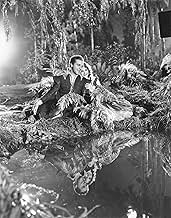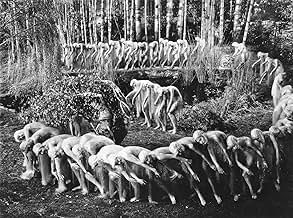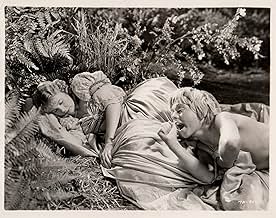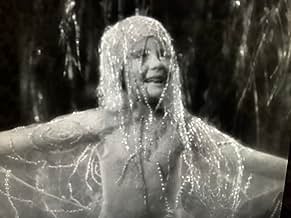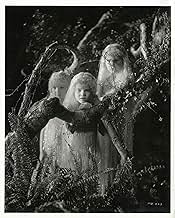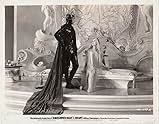IMDb RATING
6.8/10
4.1K
YOUR RATING
Two couples and a troupe of actors have an encounter with some mischievous fairies in the forest.Two couples and a troupe of actors have an encounter with some mischievous fairies in the forest.Two couples and a troupe of actors have an encounter with some mischievous fairies in the forest.
- Directors
- Writers
- Stars
- Won 2 Oscars
- 6 wins & 2 nominations total
Olivia de Havilland
- Hermia - In Love with Lysander
- (as Olivia de Haviland)
Nini Theilade
- Fairie - Attending Titania
- (as Nina Theilade)
- Directors
- Writers
- All cast & crew
- Production, box office & more at IMDbPro
Featured reviews
Since "Shakespeare in Love" made that particular playwright happening and new, check out this, Warner Bros.' wild, expensive, free-wheeling adaptation of "A Midsummer Night's Dream".
For me, James Cagney makes the movie. He's Nick Bottom, the leader (or so he believes) of a traveling troupe of actors. He gives an invigorating performance--the screen is his. At one point, he gets to wear a donkey's head (if you know the play, you know what I'm talking about), but it doesn't faze him in the least. Cagney, the most energetic screen actor, doesn't let his over-the-top approach mar his skill or care with The Bard's great words. It's the test of anyone wishing to act out a part in a Shakespeare play, which Cagney passes, to "speak" the dialogue, and by doing so, make what might be confusing on the page understandable to audiences on the screen or stage.
Warner really spared no expense with this production, which I think might have been the costliest of that year. The whole affair is like a dream in every way--it seems to sway in the wind, fragile to the touch. It features Mendolssohn music, soft-white photography (the great Hal Mohr), and some of the most incredible sets and costumes you're likely to see in a 1930s film.
Nominated for three Academy Awards: Picture, Cinematography and Editing. Bested by "Mutiny on the Bounty" for the first, it won the other two.
For me, James Cagney makes the movie. He's Nick Bottom, the leader (or so he believes) of a traveling troupe of actors. He gives an invigorating performance--the screen is his. At one point, he gets to wear a donkey's head (if you know the play, you know what I'm talking about), but it doesn't faze him in the least. Cagney, the most energetic screen actor, doesn't let his over-the-top approach mar his skill or care with The Bard's great words. It's the test of anyone wishing to act out a part in a Shakespeare play, which Cagney passes, to "speak" the dialogue, and by doing so, make what might be confusing on the page understandable to audiences on the screen or stage.
Warner really spared no expense with this production, which I think might have been the costliest of that year. The whole affair is like a dream in every way--it seems to sway in the wind, fragile to the touch. It features Mendolssohn music, soft-white photography (the great Hal Mohr), and some of the most incredible sets and costumes you're likely to see in a 1930s film.
Nominated for three Academy Awards: Picture, Cinematography and Editing. Bested by "Mutiny on the Bounty" for the first, it won the other two.
Max Reinhardt's theatre production, together with William Dieterle's directorial flair, brings Shakespeare to Hollywood. The ideas and effects within this vision are brilliant, although the detail has undoubtedly diminished with the wear and tear of several decades.
Best in the actors are Mickey Rooney as Puck, and Joe E Brown as Flute. James Cagney is Bottom, Anita Louise is Titania, Victor Jory is Oberon, Olivia de Havilland and Dick Powell are amongst the lovers. All are ok but nothing special. The little changeling is Kenneth Anger, who would later be vitriolic in his book 'Hollywood Babylon'.
Perhaps the best thing about this film is how it looks. It truly is magical, and you get the sense of fairies and sprites causing mischief and confusion deep in the woods. I have the feeling it would look superb in colour.
Best in the actors are Mickey Rooney as Puck, and Joe E Brown as Flute. James Cagney is Bottom, Anita Louise is Titania, Victor Jory is Oberon, Olivia de Havilland and Dick Powell are amongst the lovers. All are ok but nothing special. The little changeling is Kenneth Anger, who would later be vitriolic in his book 'Hollywood Babylon'.
Perhaps the best thing about this film is how it looks. It truly is magical, and you get the sense of fairies and sprites causing mischief and confusion deep in the woods. I have the feeling it would look superb in colour.
The movie is dated, true. In fact, seeing 30's Hollywood's version of Shakespearian England's version of Athenian costuming is a delight in itself. But the actors in this rendition are just amazing. Not only is the cast impressive (Cagney, Brown, Rooney, D'Havilland, Powell), but they are doing the roles with the right mixture of buffoonery and dedication to Shakespeare's love of high and low comedy together.
The casting of Cagney as Bottom was brilliant, his mixture of swagger and obliviousness is perfect, especially when played off of the great Joe E. Brown, who's rubber faced quiet performance is uproarious. Young Mickey Rooney is a wonderful puck, light and athletic, it may be his finest work. The special effects manage to give off the feeling of faerie, without overpowering what is going on. And the weaving of the two stories together works as well as might be hoped for.
I consider this to be the classic definitive Midsummer's Night Dream films. No other can ever measure up.
The casting of Cagney as Bottom was brilliant, his mixture of swagger and obliviousness is perfect, especially when played off of the great Joe E. Brown, who's rubber faced quiet performance is uproarious. Young Mickey Rooney is a wonderful puck, light and athletic, it may be his finest work. The special effects manage to give off the feeling of faerie, without overpowering what is going on. And the weaving of the two stories together works as well as might be hoped for.
I consider this to be the classic definitive Midsummer's Night Dream films. No other can ever measure up.
10artzau
Thalberg's pledge to give back to the people something good is seen in this project realized 66 years ago. Everyone is acting! No one struts or swains, dying to be a star. The young, superlovely Olivia de Havilland is a gorgeous and fun Hermia in her maiden role. Dick Powell and Ross Alexander as the two Athenian youths confused by Puckish Mickey Rooney Robin Goodfellow are wonderful in their entanglement with beautiful Jean Muir's Helena. The players, Frank McHugh, Dewey Robinson, Hugh Herbert, Grant Mitchell and the wonderful snob's snob, Arthur Treacher are topped by Jimmy ("you dirty rat") Cagney [trivia buffs know he never said those lines except in response to Gorshen and Rich Little's impressions of him at a roast before his death] and Joe E. Brown's Flute. Victor Jory, often cast as a villain is great as Oberon, as is lovely Anita Louise as Titania. There's not a weak spot in this cast and the entire play, in living Black and White, is soft, diffused and whispery as a summer night. Erich W. Korngold's music is supplemented by the exquisite Mendelssohn score and look for a tiny Billy Barty as Mustardseed, one of the sprites. There are other fine ones, the RSC's 1968 and the recent 1999 are wonderful, but, fans, take it from an old Shakespeare buff, this one is an immortal production.
A Midsummer Night's Dream was to be Jack Warner's bow to culture back during the Depression. The economical studio which specialized in urban dramas was doing something that normally MGM would have taken the lead in. In fact I'm not so sure that Louis B. Mayer decided that if Warner Brothers could make Shakespeare popular, he could do it better and hence Norma Shearer got to star in Romeo and Juliet.
The great German Impresario producer Max Reinhardt with co-direction from another German emigrant, William Dieterle, put this together. He played to Warner Brothers other strength, those Busby Berkeley musicals and their intricate numbers. Visually, A Midsummer Night's Dream is stunning with an ethereal quality as the various faeries and nymphs go through the woods. They do their thing to Mendelsohn's great music as arranged by Erich Wolfgang Korngold. In fact this was the start of Korngold's relationship with the brothers Warner and some of the great musical scores he wrote for them.
This was also the start of Olivia DeHavilland's great career. Olivia is one of the few major stars who literally went from unknown to star in one fell swoop. She had graduated high school and was doing some summer stock before entering college when Max Reinhardt spotted here while touring America with A Midsummer Night's Dream. When Warner Brothers got his services for this film, he brought with him Olivia and personally cast her as Hermia.
The film was held up with editing, scoring, retakes, and Olivia made and was seen in two low budget films before A Midsummer Night's Dream was released. So her debut is in a Joe E. Brown film, Alibi Ike. But this is her first film.
The material was familiar to Olivia, but not all her fellow players at Warner Brothers were so blessed. Dick Powell said that this film was one of the two worst experiences he had while at that studio. He had no training of any kind to do this classical piece and said he was lost through out the whole production.
James Cagney is no classical actor either, but as Bottom with or without the donkey's head on him, courtesy of Puck, Cagney brings his boisterous style to the proceedings and it works for the most part. Some of the other tradespeople in the town Frank McHugh, Dewey Robinson and Joe E. Brown look pretty lost though.
On loan out from MGM, Mickey Rooney steals the show as Puck. On orders from Victor Jory the Faerie King to play a little joke on his wife Anita Louise, Rooney casts a spell on her that will make her fall for the first living soul she sees. Rooney decides on is own to sweeten the joke by giving James Cagney a donkey's head and making sure that Louise sees him first. And of course the four lovers, Dick Powell, Ross Alexander, Jean Muir, and Olivia DeHavilland, Rooney confuses their affections as well as a bonus.
Rooney who was another kid actor up to this point, got his first real critical notices in this. It led to his becoming a major star over at MGM and Louis B. Mayer never lending him out to anyone again as long as he was under contract there.
A Midsummer Night's Dream is a curious film. Shakespearean purists might recoil at some of the casting, but I'm sure it was entertaining enough for the Depression audiences.
The great German Impresario producer Max Reinhardt with co-direction from another German emigrant, William Dieterle, put this together. He played to Warner Brothers other strength, those Busby Berkeley musicals and their intricate numbers. Visually, A Midsummer Night's Dream is stunning with an ethereal quality as the various faeries and nymphs go through the woods. They do their thing to Mendelsohn's great music as arranged by Erich Wolfgang Korngold. In fact this was the start of Korngold's relationship with the brothers Warner and some of the great musical scores he wrote for them.
This was also the start of Olivia DeHavilland's great career. Olivia is one of the few major stars who literally went from unknown to star in one fell swoop. She had graduated high school and was doing some summer stock before entering college when Max Reinhardt spotted here while touring America with A Midsummer Night's Dream. When Warner Brothers got his services for this film, he brought with him Olivia and personally cast her as Hermia.
The film was held up with editing, scoring, retakes, and Olivia made and was seen in two low budget films before A Midsummer Night's Dream was released. So her debut is in a Joe E. Brown film, Alibi Ike. But this is her first film.
The material was familiar to Olivia, but not all her fellow players at Warner Brothers were so blessed. Dick Powell said that this film was one of the two worst experiences he had while at that studio. He had no training of any kind to do this classical piece and said he was lost through out the whole production.
James Cagney is no classical actor either, but as Bottom with or without the donkey's head on him, courtesy of Puck, Cagney brings his boisterous style to the proceedings and it works for the most part. Some of the other tradespeople in the town Frank McHugh, Dewey Robinson and Joe E. Brown look pretty lost though.
On loan out from MGM, Mickey Rooney steals the show as Puck. On orders from Victor Jory the Faerie King to play a little joke on his wife Anita Louise, Rooney casts a spell on her that will make her fall for the first living soul she sees. Rooney decides on is own to sweeten the joke by giving James Cagney a donkey's head and making sure that Louise sees him first. And of course the four lovers, Dick Powell, Ross Alexander, Jean Muir, and Olivia DeHavilland, Rooney confuses their affections as well as a bonus.
Rooney who was another kid actor up to this point, got his first real critical notices in this. It led to his becoming a major star over at MGM and Louis B. Mayer never lending him out to anyone again as long as he was under contract there.
A Midsummer Night's Dream is a curious film. Shakespearean purists might recoil at some of the casting, but I'm sure it was entertaining enough for the Depression audiences.
Did you know
- TriviaWhen the forest that Max Reinhardt designed could not be lit properly, cinematographer Hal Mohr thinned the trees slightly, sprayed them with aluminum paint and covered them with cobwebs and tiny metal particles to reflect the light. As a result, he became the first (and only) write-in winner of an Academy Award.
- GoofsCorrective lenses were introduced in the 13th century so they could have been worn in Shakespeare's time.
- Quotes
Hermia, in Love with Lysander: [to Helena] How low am I, you painted maypole? Speak! How low am I? I am not yet so low but that my nails can reach into your eyes!
- Crazy creditsThe opening credits appear as if they were "trickling down" from the top of the screen.
- Alternate versionsThe original 132-minute roadshow version of this film has been restored, shown on cable, and issued on videocassette and DVD. For many years, though, this film was shown only in its general release version, a 117-minute version painstakingly edited by the studio (so that the cuts would not be noticeable), which shifted the order of some sequences and eliminated others.The 2007 DVD release also restores the Intermission title card, not seen since the film's original roadshow release in 1935, as well as including the overture and exit music.
- ConnectionsFeatured in A Dream Comes True (1935)
- SoundtracksA Midsummer Night's Dream: Overture and Incidental Music
(1826) (uncredited)
Music by Felix Mendelssohn
Adapted by Erich Wolfgang Korngold
Heard throughout the film
- How long is A Midsummer Night's Dream?Powered by Alexa
Details
- Release date
- Country of origin
- Official site
- Language
- Also known as
- A Midsummer Night's Dream
- Filming locations
- Production companies
- See more company credits at IMDbPro
Box office
- Gross worldwide
- $2,616,000
- Runtime2 hours 13 minutes
- Color
- Sound mix
- Aspect ratio
- 1.37 : 1
Contribute to this page
Suggest an edit or add missing content

Top Gap
By what name was Le songe d'une nuit d'été (1935) officially released in India in English?
Answer

